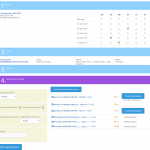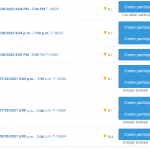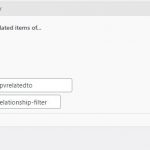Hi Christian,
I have a school website where I want staff members to book appointments for students. Same Appointments can be booked by multiple students. For every booking a "participation" post type is being created, which is why a I need a form to do so.
As soon as there is a participation for the student for that appointment, the form should not be displayed.
Would be great to get some help here, as I've been struggling with this.
Post types:
Courses
Appointments
Participations
Students
Relations:
Courses [0 .. 1] << Appointments [*]
Appointments [0 .. 1] << Participations [*]
Students [0 .. 1] << Participations [*]
Detailed description:
Staff is selecting a student and a course, then all related appointments for this course are shown.
The student is available as a URL param "studentid".
Within the appointments loop I want to have a form that gets displayed, when there is *no* Participation to that particular appointment, *which belongs to the student*. If there *is* a participation to that appointment which belongs to the student, then some text should be displayed and no form.
On last two things I am struggling.
The form to create the particpiation itself includes the following relationship fields:
field='@appointment-participation.parent'
field='@student-participiation.parent'
All forms are automatically populated with data from course view, appointment view, from URL Params and from wpv-attributes.
Using Views latest version and no Blocks GUI for this.
Thanks and best regards
Bernhard
Hello,
Within the "appointments loop" you mentioned above, you can display a child post view:
- Query "Participations" posts
- Filter by post type relationship between Appointments and Participations [*]
- If there is any result, display "some text"
https://toolset.com/documentation/programmer-reference/views/views-shortcodes/#wpv-items-found
- If no item found, display the "form "
https://toolset.com/documentation/programmer-reference/views/views-shortcodes/#vf-153285
For the question "from URL Params and from wpv-attributes"
You can get URL parameter value with shortcode [wpv-search-term], for example:
[wpv-search-term param="my-url-param"]
https://toolset.com/documentation/programmer-reference/views/views-shortcodes/#wpv-search-term
And get view's shortcode attribute with shortcode [wpv-attribute]
https://toolset.com/documentation/programmer-reference/views/views-shortcodes/#vf-309292
And pass them to Form field shortcode [cred_field] as parameter "value":
https://toolset.com/documentation/programmer-reference/forms/cred-shortcodes/#cred_field
value. Optional. Preset value
Hi Luo,
thanks. The basics are working, but struggling with one scenario where there are more than 1 participations.
My setup:
Within the "appointments loop"
- Query "Participations" posts
- Filter by post type relationship between Appointments and Participations [*]
- If there is any result, display with the wpv-loop section:
In all scenarios below I want to check just for 1 student and if a participation form should be displayed or not. The ID of this student is available via URL param "studentid".
<!-- 1. when already booked -->
[wpv-conditional if="( '[wpv-search-term param="studentid"]' eq '[wpv-post-id item="@student-participation.parent"]' )"]Already booked[/wpv-conditional]
<!-- 2. participation existing but no student related -->
[wpv-conditional if="( '[wpv-post-id item="@student-participation.parent"]' eq '' )"][cred_form form="newparticipation" post='[wpv-attribute name="appointmendid"]'][/wpv-conditional]
<!-- 3. when found 1 participation and student from participiation is not equal to student ID from URL -->
[wpv-conditional if="( '[wpv-found-count]' eq '1' ) AND ( '[wpv-post-id item="@student-participation.parent"]' ne '[wpv-search-term param="studentid"]' )"][cred_form form="newparticipation" post='[wpv-attribute name="appointmentid"]'][/wpv-conditional]
<!-- 4. when found more than 1 participation and student from URL param studentid is not related to the participations -->
--> not working yet
[wpv-conditional if="( '[wpv-view name="countparticipations" appointmentid="[wpv-attribute name='appointmentid']"]' gte '2' ) AND ( '[wpv-post-id item="@student-participation.parent"]' ne '[wpv-search-term param="studentid"]' )"][cred_form form="newappointment" post='[wpv-attribute name="appointmentid"]'][/wpv-conditional]
Could you please help with scenario 4?
Uploaded a picture of my appointment booking wizard if it help somehow.
Many thanks
Bernhard
For the new question:
4. when found more than 1 participation and student from URL param studentid is not related to the participations
1) found more than 1 participation
You can try below condition:
( '[wpv-found-count]' gt '1' )
2) student from URL param studentid is not related to the participations
( '[wpv-post-id item="@student-participation.parent"]' ne '[wpv-search-term param="studentid"]' )
All [wpv-conditional] shortcodes should be setup into the child post view
Hi Luo,
I tried wpv-found-count gt1 and gte2 together with AND conditon as you stated.
With this, I will get more than 1 participation form displayed per appointment when there are multiple participations where my student is not related to.
For every participation where my student is not part of, a form is being displayed.
The overall rule is still: Display a form, when there is no participation between my student (from URL param) and that appointment.
[wpv-layout-start]
[wpv-items-found]
<!-- wpv-loop-start -->
<wpv-loop>
<!-- 1. when already booked -->
[wpv-conditional if="( '[wpv-search-term param="studentid"]' eq '[wpv-post-id item="@student-participation.parent"]' )"]Already booked[/wpv-conditional]
<!-- 2. participation existing but no student related -->
[wpv-conditional if="( '[wpv-post-id item="@student-participation.parent"]' eq '' )"][cred_form form="new_participation_form" post='[wpv-attribute name="appointmentid"]'][/wpv-conditional]
<!-- 3. when found 1 participation and student from participiation is not equal to student ID from URL -->
[wpv-conditional if="( '[wpv-found-count]' eq '1' ) AND ( '[wpv-post-id item="@student-participation.parent"]' ne '[wpv-search-term param="studentid"]' )"][cred_form form="new_participation_form" post='[wpv-attribute name="appointmentid"]'][/wpv-conditional]
<!-- 4. when found more than 1 participation and student from URL param studentid is not related to the participations -->
[wpv-conditional if="( '[wpv-found-count]' gt '1' ) AND ( '[wpv-post-id item="@student-participation.parent"]' ne '[wpv-search-term param="studentid"]' )"][cred_form form="new_participation_form" post='[wpv-attribute name="appointmentid"]'][/wpv-conditional]
</wpv-loop>
<!-- wpv-loop-end -->
[/wpv-items-found]
[wpv-no-items-found]
[cred_form form="new_participation_form" post='[wpv-attribute name="appointmentid"]'] (no other participant)
[/wpv-no-items-found]
[wpv-layout-end]
BR Bernhard
For the question:
The overall rule is still: Display a form, when there is no participation between my student (from URL param) and that appointment.
It does not need [wpv-conditional] shortcode at all, you just need to setup a child post view as I mentioned above:
https://toolset.com/forums/topic/appointment-booking/#post-2144415
And you can also add another post type relationship filter between Students and Participations by the URL parameter "studentid", see my screenshot relationship-filter3.JPG
I unfortunately cannot get it working and not sure if I fully understood.
Appointments View:
<wpv-loop>
[wpv-view name="view-participation"]
</wpv-loop>
Participation View: <-- this is the mentioned child post view, right?
Post type: participations
Filter by post type relationship between Appointments and Participations [*]
Filtered by "The current post in the loop"
When I change Filtered by "The current post in the loop" to post with ID set by URL param there will be a form displayed for all appointments.
Am I missing something here? Are you talking about a third view I have to setup?
I can provide details to my site.
OK, please provide your website credentials in below private message box, also point out the problem page URLs and view URL, thanks
The credentials you provided above redirect me to URL:
hidden link
Please check it, how can I login into your website? please check it, thanks
Sorry, please go to hidden link enter the credentials and click on blue button "anmelden". Then you will be able to access hidden link
Thanks for the details, I am checking it in in your website, will update here if find anything
In your case, it needs to setup two relationship filters into post view "Quick_CheckforexistingRelation_Protokoll_Termin":
- Appointments [0 .. 1] << Participations [*] -> Termine [0 .. 1] << Protokolle [*]
- Students [0 .. 1] << Participations [*] -> Schuelerinnen [0 .. 1] << Protokolle [*]
But within Views UI, it can add only one relationship filter, you need to setup custom codes to add the another relationship filter, for example:
https://toolset.com/forums/topic/search-filter-with-two-post-relation-ships/
If you need more assistance for it, please provide your website FTP/SFTP access in below private message box, thanks
Thanks for the details, I am checking it in your website, will update if find anything.
I have done below modifications in your website:
Edit the custom code "second-relationshipfilter", add line 10:
add_filter( 'wpv_filter_query', 'filter_by_parent_schueler_func', 99, 3 );
Activate above custom code, test it in frontend, I get PHP error:
Out of memory (allocated 1642389504) (tried to allocate 1608519680 bytes) in /home/u803210759/domains/studi.fm/public_html/meinstudi/wp-content/plugins/wp-views/embedded/inc/wpv-filter-query.php on line 829
Since your website is using other plugins, and the problem page is using a nested post views, it needs to increase the PHP memory and output the view's results.
I am trying to find other workaround for this case, will update here if find anything
Thanks Luo! My issue is resolved now.
It is working with the line you edited + I deactivated Query Monitor plugin which is activated for testing purposes. It needs a lot of RAM.
I am now quering to relations with this code:
add_filter( 'wpv_filter_query', 'filter_by_parent_student_func', 99, 3 );
function filter_by_parent_student_func( $query_args, $view_settings, $view_id ) {
if ( $view_id == 16150 && isset($_GET['student'])) {
if(!isset($query_args['toolset_relationships'])){
$query_args['toolset_relationships'] = array();
}
$query_args['toolset_relationships'][] = array(
'role' => 'child',
'related_to' => $_GET['studentid'],
'relationship' => 'student-participation'
);
}
return $query_args;
}
Many thanks
Bernhard


